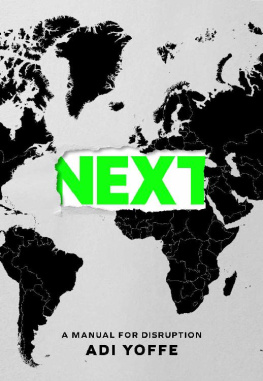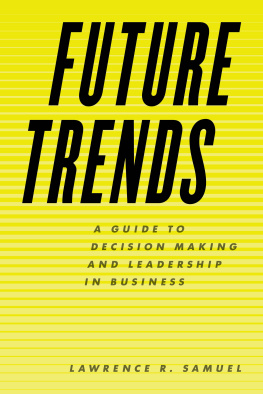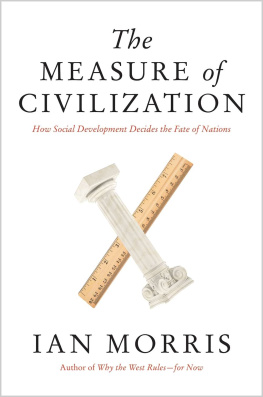PLUNGING TO LEVIATHAN?
Studies in Comparative Social Science

A series edited by Stephen K. Sanderson

Titles Available
Revolutions: A Worldwide Introduction to Political and Social Change,
Stephen K. Sanderson (2005)
Plunging to Leviathan? Exploring the Worlds Political Future,
Robert Bates Graber (2005)
PLUNGING TO
LEVIATHAN?
EXPLORING THE WORLDS
POLITICAL FUTURE
Robert Bates Graber
First published 2006 by Paradigm Publishers
Published 2016 by Routledge
2 Park Square, Milton Park, Abingdon, Oxon OX14 4RN
711 Third Avenue, New York, NY 10017, USA
Routledge is an imprint of the Taylor & Francis Group, an informa business
Copyright 2006 ,Taylor & Francis.
All rights reserved. No part of this book may be reprinted or reproduced or utilised in any form or by any electronic, mechanical, or other means, now known or hereafter invented, including photocopying and recording, or in any information storage or retrieval system, without permission in writing from the publishers.
Notice:
Product or corporate names may be trademarks or registered trademarks, and are used only for identification and explanation without intent to infringe.
Library of Congress Cataloging-in-Publication Data
Graber, Robert Bates, 1950
Plunging to leviathan?: exploring the worlds political future / Robert Bates Graber.
p. cm. (Studies in comparative social science)
Includes bibliographical references and index.
ISBN 159451156X (hc)
1. Political development. 2. State, The. 3. World politics. I. Title.
II. Series.
JC489.G69 2005
320.011dc22
2005012206
ISBN 13 : 978-1-59451-156-1 (hbk)
ISBN 13 : 978-1-59451-157-8 (pbk)
To Tim, for telling me ten years ago to write this book
Contents
A poor prognosis, muttered old Doc Roderick. He spoke not of a current patient; Roderick had been long retired from medical practice when I made his acquaintance some twenty years ago. He is a small, stooped man, delicate but vigorous, still keen of mind. Black half-frame spectacles perch on an exquisitely chiseled nose; his white hair, though wispy, objects as always to having been combed back.
The patient under discussion is humanity itself. I allow that we do seem to be dangerously more adept at technological innovation than at social relationships. I nearly shout this truism into the side of his tilted head; Roderick of late has lost much of his hearing. His eyebrows go up. But human nature! he declares, as if that was what really settled the question. I cannot help thinking that my aged friends bright eyes, high intelligence, and octogenarian energy somehow refute his pessimism as to the future of his kind: The medium contradicts the message. Shaking his head though, the old physician repeats: A poor prognosis!
Where, in the end, is humanity headed? Its a tricky and dangerous business, of course, to predict things (especially the future, helpful souls like to add). Still, we cannot help but raise the question; it is simply too interesting and important to go away.
Recent progress in several disciplines has produced the first scientific predictions of our political future. Being scientific forecasts rather than prophetic revelations, these predictions lay no claim to absolute certainty; indeed, some of them contradict each other. My view, however, is that one among them has a definite edge over the others. This prediction, along with its background and its competitors, deserves airing beyond the specialized and sometimes stuffy scholarly journals and professional conferences to which it has been confined up until now. The prediction deserves a wider audience not only because it has theoretical and practical significance but also because it just happens to bring a message of hopea prognosis a good bit brighter than old Doc Rodericks. That is why I have written this book.
Acknowledgments
Exploring political evolution for more than twenty years, I naturally have enjoyed stimulation and support from many students and colleagues. Those whose assistance came in the form of relatively discrete chunks I have tried to acknowledge, along the way, in the resulting publications. Though I shall not attempt here to thank them all again by name, I want these individuals, and others who ought to have been thanked but were not, to know that I remain appreciative of the insights and inspiration I gained from them.
I do want to thank some people here though, beginning with Tim Roland, who gave me the idea in the first place.
I want to thank my wife Rose, whose astute comments on matters political continue to teach me much; my daughters Kate and Karen, who liked an early draft; and my assistant Ashley Wagoner, who helped prepare the manuscript.
Thanks, too, to Karl Yambert, the outside reviewer, and all the people at Paradigm Publishers who have been such a pleasure to work with, notably Dean Birkenkamp, Melanie Stafford, Jason Potter, and Dianne Ewing. And I am grateful to Steve Sanderson for seeing fit to include Plunging to Leviathan? in the new series he is editing for Paradigm.
Gerhard Lenskis conception of what societies are and how they should be studied I have found a trusty guide for over thirty years now; and Robert Carneiros firm conviction that political evolution has resulted from an interaction between measurable demographic processes and definite material conditions, and as such ought to be explainable mathematically, has been hugely inspiring. I thank him too for his invaluable critique of an earlier version, and for indulging, with characteristic good cheer, my use of his less optimistic prognostication as a foil!
leviathan: a sea monster often symbolizing evil in the Old Testament and in Christian literature
leviathan state (usu. cap.): an all-powerful state usu. held to be characterized by a vast bureaucracy and machinery of coercion and exercising totalitarian control over its citizens
For over 99 percent of our evolutionary past, human beings lived by gathering and hunting. The tools they used, the ways they interacted, and the beliefs they held: All varied, not only because people are different, but also because different groups inhabited different environments.
Fossilized bones and tools of stone supply our only direct evidence of these people and their cultures. In some parts of the world, however, hunting-gathering people managed to survive into recent times; ethnographic knowledge about them, priceless in its own right, sheds much light on how ancient huntergatherers must have lived.
Nearly all known hunter-gatherers live in groups that are smalltypically numbering from a dozen to three dozen peopleand that move frequently in search of the plant and animal foods essential to their survival; it seems all but certain that ancient humans did likewise.
The two main forms of leadership among hunter-gatherers are religious and political. Religious leaders (shamans, anthropologists call them) deal with the spirit world in which the people believe. In some societies they are as likely to be women as men; in any case, they must be skilled at conducting impressive rituals, especially for curing purposes.








 A series edited by Stephen K. Sanderson
A series edited by Stephen K. Sanderson 
